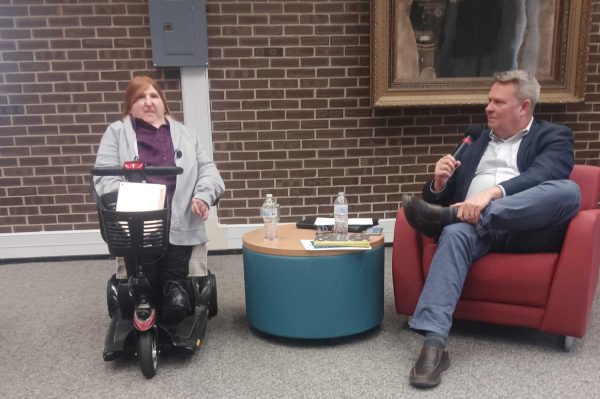Accountancy alumnus achieves real-life prowess
October 5, 2005
Armed with a bachelor’s degree in accountancy, Brian Bulkley, like many other NIU students, went into the real world to see if the past four years and several thousand dollars would take him anywhere. They sure did.
Bulkley graduated from NIU’s College of Business in 1982. Since then he has climbed the career ladder. Today Bulkley is the partner in charge of the Chicago Region Manufacturing and Distribution practice as well as a member of the Executive Committee for Virchow, Krause and Company LLP, one of the largest accounting and consulting firms.
Bulkley knew from a young age that he wanted accounting to be a part of his life. The decision came after he acquired his first taste for crunching numbers in high school.
“I had a couple classes in high school which were very interesting,” Bulkley said. “From what I was able to research in high school, it appeared accounting was a good field to get into.”
As a student, Bulkley managed to find a healthy balance between work and pleasure. It is a balance he likes to continue to adhere to, even in his professional career.
“There is really nothing I would change [about my college career],” Bulkley said. “I wouldn’t have wanted to study more since that would have reduced some of the social aspects of school which is also important to a student’s development. Some of the mistakes I made my first semester probably helped me the remaining three and a half years at NIU.”
Once all the hard work and studying were said and done, Bulkley emerged from NIU into the real world which welcomed him with open arms. Because of his degree from NIU a lot of doors were open to him, especially in the Chicagoland area.
“My degree from NIU was very instrumental in helping me get where I am today,” Bulkley said. “[Graduating] from Northern’s school of business alone helped open many opportunities because of the high reputation the business school, specifically the accounting department, had in the business community in Chicago.”
As ready as the business world was to receive him, Bulkley wasn’t necessarily prepared for what it had in store. Although he did well in his accounting classes, they didn’t fully prepare him for what actual accounting entails.
“In school you learn theory and there is generally a correct answer,” Bulkley said. “In the real world you find out that there is no correct answer. There is, however, the opportunity to come up with creative solutions to client problems or situations.”
Over the years Bulkley has learned the ropes of professional accounting and has built a very impressive resume, garnering some well-deserved respect.
Bulkley doesn’t spend his days bean counting as so many people assume accountants do. Instead, most of his work is people-based. On any given day Bulkley makes 20 to 30 phone calls and writes and responds to 40 to 50 e-mails to clients and co-workers. He is constantly in and out of meetings and occasionally out of the office with clients to discuss new business opportunities or products. It is this mix of activities that keeps Bulkley interested in his job.
“I enjoy the diversity in work,” Bulkley said. “Helping clients with a tax or accounting problem, providing business advisory services and getting involved with long-term planning with clients. I also enjoy the types of clients I work with. As a manufacturing partner, most of my clients are in the manufacturing industry.”
Anyone who has ever taken an accounting class will probably tell you spreadsheets and accumulated depreciation are not always the most interesting, fabulous things in the world to work on all day. However, it is the people Bulkley finds himself working with that make the job truly fun. Just because Virchow, Krause and Company LLP is one of the largest and most well-respected accounting firms around, doesn’t mean the work environment is equally daunting.
“There always seems to be time for some levity while at work,” Bulkley said. “Whether it’s a practical joke or just kidding around. Some of the most interesting things either wouldn’t make sense to someone not in the profession or can’t be discussed in print.”










